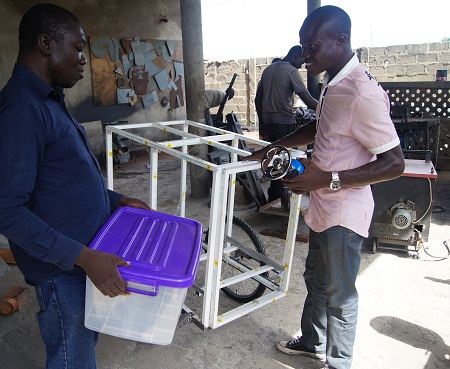Healthy Foods and New Jobs, Part 1: MamaCarts learns valuable lessons while launching food cart delivery service from scratch
Editor’s note: This is the first of a two-part blog about MamaCarts, a food cart microfranchise venture that sells nutritiously complete meals to address chronic malnutrition in growing urban and peri-urban markets. In part one, MamaCarts Co-Founder Rachael Miller looks at some of the lessons learned in launching the venture from scratch. In part two, Miller delves into what it’s like to register a business or an NGO in Benin, West Africa.
So, you have a great idea, something with impact that people can really get behind. You write grant after grant, hoping a funder will see the value in your mission and provide the support necessary to launch your dream. And then, IT HAPPENS!
2014 has been a big year for the MamaCarts team and we learned that making the leap from concept to execution, while exciting, is incredibly daunting. Six months in, we have learned some invaluable lessons about fostering a startup culture from scratch.
MamaCarts began by pitching an idea at a business plan competition and culminated with receiving a 2013 Rockefeller Foundation Centennial Innovation Challenge Award. We’re launching a food cart delivery service, focused on improving street food conditions via direct sales and certification trainings.
After securing funds in December 2013, we launched a pilot in Benin, West Africa, just a month later. We started with a market survey of 1,000 street food consumers and 200 street food vendors. Finally, we had boots on the ground with resources to prove that there is indeed a market need for our product. Overwhelmingly, the feedback was, “Yes, street food needs to improve.”
 We see street food through the lens of public health. Not only does MamaCarts want to establish our products as both aspirational and healthy, ultimately we want to elevate the standard for sanitation and nutrition overall. This means recognizing the demand for better food and providing resources to vendors to provide it.
We see street food through the lens of public health. Not only does MamaCarts want to establish our products as both aspirational and healthy, ultimately we want to elevate the standard for sanitation and nutrition overall. This means recognizing the demand for better food and providing resources to vendors to provide it.
(Part of the MamaCarts business model is to build the carts locally. Ibrahim Tchan is pictured, at right, overseeing construction. Photo by Rachael Miller)
Resources like HACCP (hazard analysis and critical control points) and regular point-of-sale food inspectors have yet to become the norm at our pilot site. In addition to forming the administrative part of the organization, we have the opportunity to create and institute community-wide food safety systems from the ground up.
In response to this market gap, MamaCarts created a two-pronged approach for market entry to empower both street food vendors and consumers to make better choices; direct sales as well as certification training for those vendors outside our organization. Our model is designed to strengthen supply chains from ingredient producers to end consumers.
We begin with sourcing ingredients from local suppliers, buying post-prime produce and locally welding (versus importing) food carts. Meals are prepared by trained cooks at the MamaCarts’ Center and sold at predetermined street-side locations via food carts. All cart food remaining at the end of the day is composted into fertilizer and put back into our supply chain.
As a new organization six months into operations, here are some of the lessons our team has learned thus far:
1. Be ready for change. If we’re not changing, we’re doing something wrong. Revisiting the problem which you set out to solve will help avoid “mission creep” and frame every decision the organization makes.
2. Understand funder parameters. Some funders are more flexible than others. It is essential to keep them updated as to the changes in model, funding needs and budget line items to minimize surprises when reports are due.
3. Set up for scale. If you’re not from that community and you don’t have that local evangelist who is very well connected in the community, how will your organization continue if you leave tomorrow?
4. Embrace the chaos. You will be uncomfortable, you will question everything and you will feel like no one has ever gone through this before. Rest assured, someone has. Google, connect, email and Facebook. Your tribe is out there and they support you!
5. Avoid “mission creep”: Regardless of the changes in our model thus far, our problem statement remains the same. When we make changes to our model, we first revisit our mission to ensure operations are moving in the right direction: “The increasing number of people living in expanding urban communities often rely on the informal street food economy as both a source of income and meals. Several root factors compound to prevent these underserved, urban communities from accessing clean, nutritious foods on a regular basis and vendors from providing them.”
Rachael Miller is a MamaCarts co-founder and street food evangelist.
- Categories
- Agriculture, Education, Health Care, Social Enterprise
